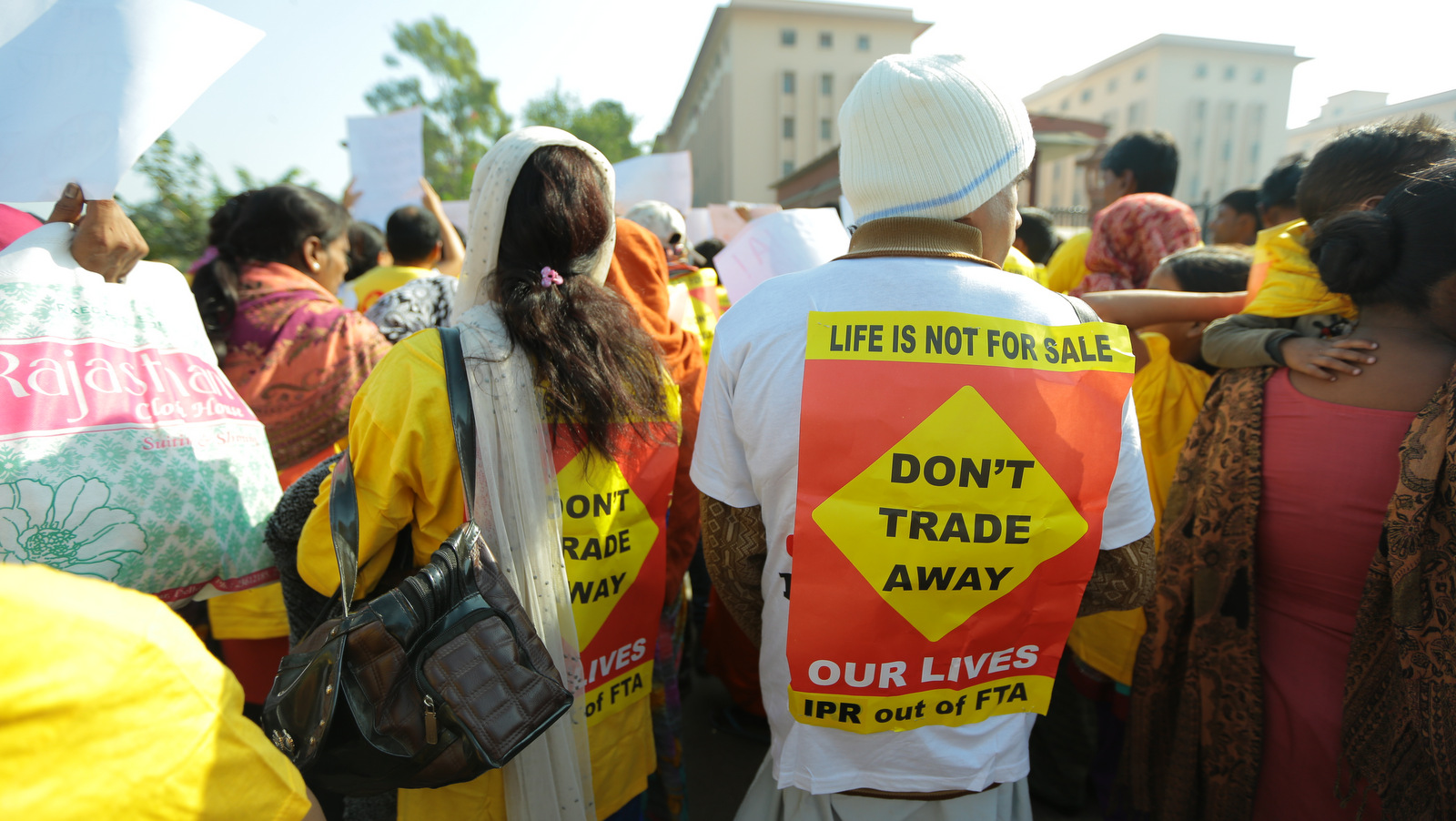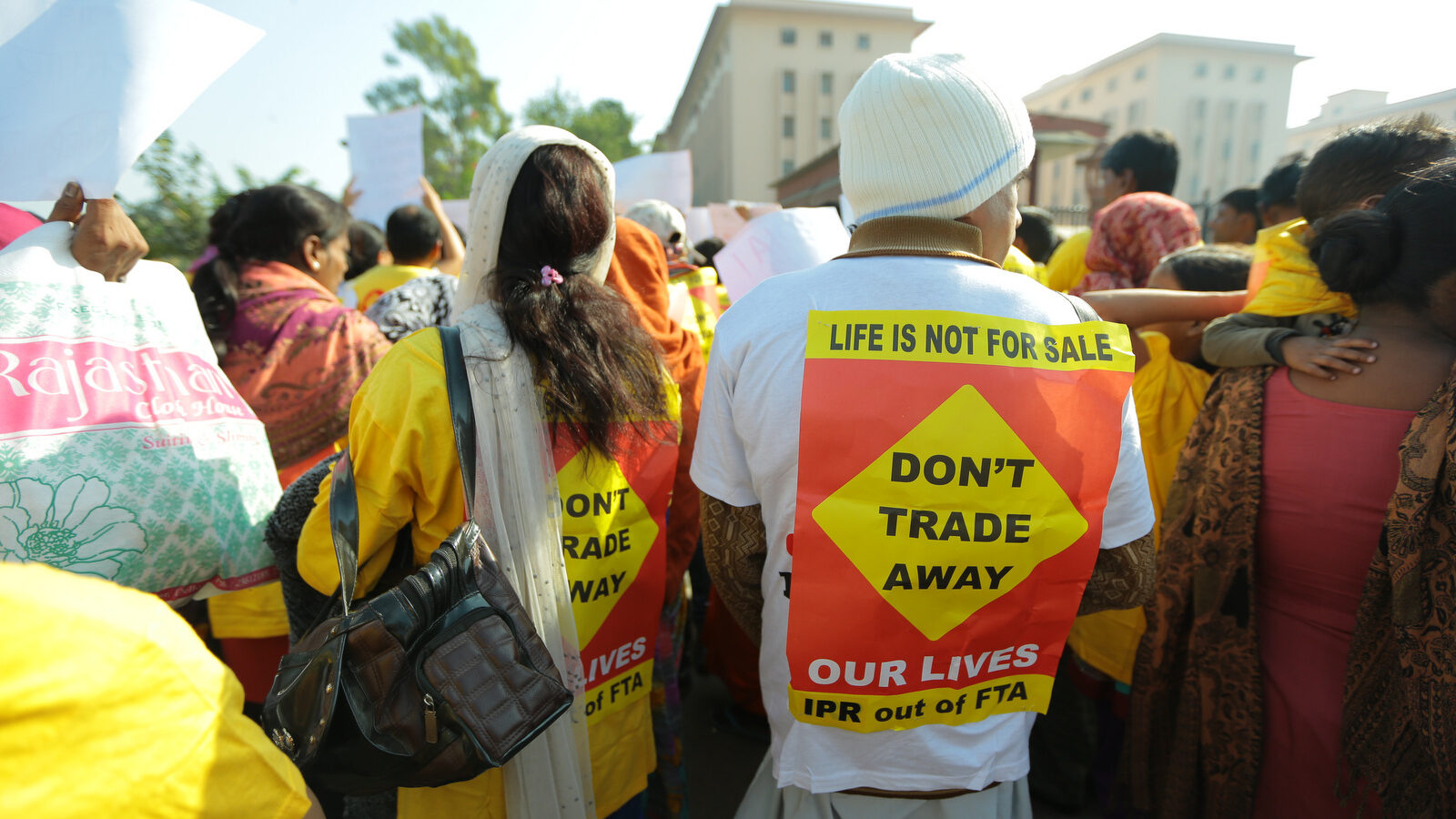
It’s been a big few weeks for leaked trade agreements. Just when we thought we had seen all the leaked text of the Trade in Services Agreement (TISA), Wikileaks went ahead and published some more yesterday. And on the same day, a leaked draft of the intellectual property chapter of yet another trade agreement, the Regional Comprehensive Economic Partnership (RCEP) was leaked by Knowledge Ecology International (KEI).
If we described TISA as a treaty you’ve never heard of, RCEP has been even more obscure. RCEP can be compared with the Trans-Pacific Partnership (TPP), except that rather than being driven by the United States, it is being driven by the ten-member Association of South East Asian Nations (ASEAN), with the addition of their trading partners from the broader Asia-Pacific region including most notably India and China, who are absent from the TPP pact.
We might then, expect that RCEP could be the “anti-TPP”; a vehicle for countries to push back against the neo-colonial ambitions of the United States, by proposing alternative, home-grown standards on the TPP’s thorniest issues such as copyright, patents, and investor protection. Some members of RCEP have indeed spoken out against the TPP because of its unbalanced promotion of strict copyright and patent laws, and some commentators have characterized RCEP and the TPP as competitors.
But based on yesterday’s leaks, the promise of RCEP pushing back against the TPP is being squandered. Instead, its IP chapter is turning out as a carbon copy. The text for the chapter that South Korea proposes, which KEI rightly and succinctly describes as “terrible”, calls for many of the same provisions and more, including:
- Copyright terms of life plus 70 years.
- Prohibiting temporary copies of works in electronic form (a thoroughly misguided and anti-innovation provision that has even been erased from the TPP).
- Confining copyright limitations and exceptions to those which comply with the three-step test, which ignores exceptions, such as the quotation right, that are exempted from that test under international law.
- Remuneration rights to performers for radio airplay, which goes beyond U.S. law.
- A prohibition on the Internet retransmission of broadcasts, mirroring proposals for a Broadcast Treaty that would inhibit the free use of public domain material.
- A prohibition on trafficking in devices used to circumvent DRM, even if the circumvention is for fair use purposes.
- Inflated awards for copyright or patent infringement, by calculating damages payable for the infringing works on the assumption that they were sold at full retail market value.
- Granting ex officio authority to customs authorities that allows them to seize goods suspected of being infringing at the border, without even the need for a complaint by the claimed rightsholder.
- Criminal penalties for “commercial scale” copyright and trademark infringement, even where the infringer has not sought or made any profit from the activity.
- Criminal penalties against those who record any part of an audiovisual work in a cinema, regardless of whether the clips recorded would amount to fair use, for example because they are to be used in criticism or review.
- Suspension of the Internet accounts of repeat infringers, and censorship of bulletin boards that are “considered to seriously damage the sound use of copyrighted works” (whatever that means).
- Authorizing a fast-track process for rightsholders to obtain personal information of alleged infringers from their ISP, without a judicial order.
This draft is much worse than a previous leaked Japanese proposal that was earlier published by KEI. It’s far worse than ACTA, and is even worse than the most recent leaked draft of the TPP. Far from setting up a positive alternative to the TPP, South Korea is channeling the USTR at its worst here—what on earth are they thinking? The answer may be that, having been pushed into accepting unfavorably strict copyright, patent, and trademark rules in the process of negotiating its 2012 free trade agreement with the United States, Korea considers that it would be at a disadvantage if other countries were not subject to the same restrictions.
There are other examples of this kind of vicious cycle; for example, when negotiating its FTA with the United States, Australia resisted increasing its copyright term to life plus 70 years (knowing that it would derive no benefit from doing so), before eventually capitulating. Now Australia (along with Chile and Singapore, both of which were also forced into increasing their copyright terms in similar circumstances), are amongst those pushing extended copyright terms to other countries in the TPP. (We know this from the first leaked text of the TPP IP chapter, which reveals them as proponents of a life plus 70 year term.)
Since RCEP is shaping up as even more extreme than the TPP, one might well ask with resignation whether concluding a trade agreement with balanced IP rules is actually impossible. Surprisingly, it isn’t. Consider the Trans-Pacific Strategic Economic Partnership [PDF] (TPSEP), yet another trade agreement in the so-called “noodle bowl” of bilateral and multilateral Asian FTAs. If the TPSEP sounds like a relative of the TPP, that’s because it is. In fact, it’s the predecessor of that broader agreement, that was concluded in 2006 between Chile, New Zealand, Brunei, and Singapore, and remains in force between those countries.
For those of us used to FTAs that ratchet up standards of copyright, patent and trademark protection, the TPSEP is somewhat remarkable. It explicitly acknowledges “the need to achieve a balance between the rights of right holders and the legitimate interests of users and the community with regard to protected subject matter,” but goes further than this to give some specific examples of user-friendly policies that countries should be permitted to adopt, including:
- Respecting the first sale doctrine, even for works sold across borders.
- Prohibiting companies from removing your fair use rights through small print in license agreements.
- Allowing users to bypass DRM for fair use purposes.
These are the kind of pro-user rules that could have differentiated RCEP from the TPP, if its members were bold enough to think outside the box. And since RCEP is still at an earlier stage of discussion, they still can: Korea’s proposed rules are an opening gambit, not an agreed text.
Unfortunately, the process of negotiation of the RCEP is just as closed as that of the TPP, which makes it the wrong place for IP rules altogether. But now that the text has been leaked and it has been revealed to be so atrocious, we can begin to build pressure for the negotiating countries to open up the process. If, heaven forbid, the TPP eventually passes—and perhaps even more so if it doesn’t—the Asia-Pacific region needs to ensure that its trade regime doesn’t lock in restrictive and punitive copyright, patent, and trademark rules.



